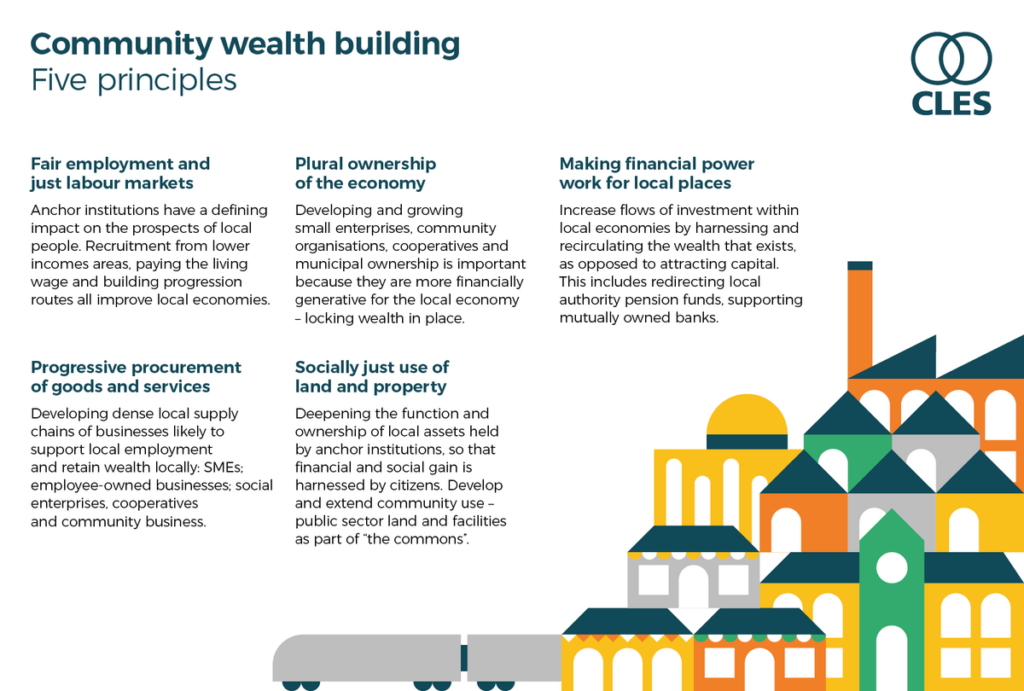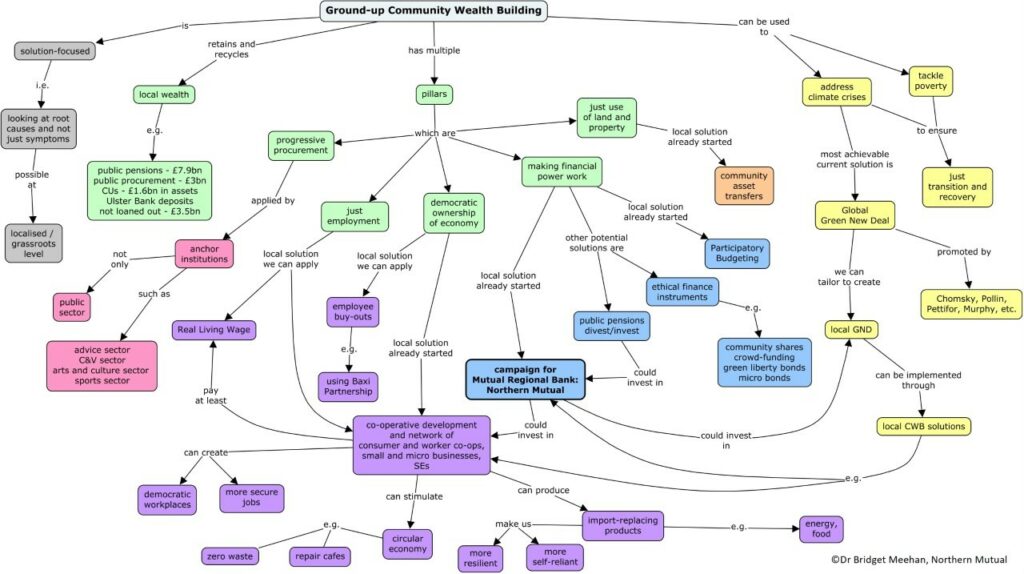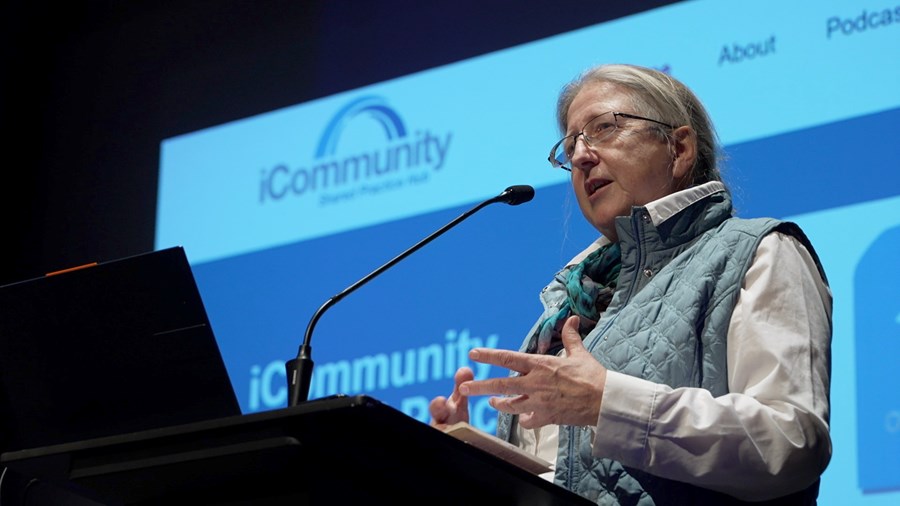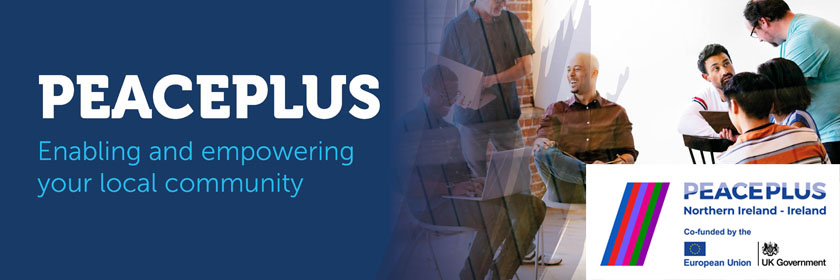The Case for Ground Up Community Wealth Building on the Island of Ireland

“You never change things by fighting the existing reality. To change something, build a new model that makes the existing model obsolete” – Richard Buckminister Fuller – architect and philosopher
Working in a Belfast Welfare Rights Centre through the austerity years following the banking crash of 2008, I witnessed spiraling levels of poverty. It was abundantly clear that as well as mitigating poverty, that we needed to take a more upstream approach to preventing it.
In 2018, I read about how Preston City Council had been named most improved city in the UK through pursuing a local economic strategy called Community Wealth Building (CWB). Using public sector organisations, referred to as anchor institutions, such as the council itself and the local university, to ensure fair wages and support for local businesses they had created 4,000 new living wage jobs and halved unemployment in four years. This approach was not only common sense but also totally doable as it did not require any new money just making better use of the money already in a place. Most importantly it was getting results.
CWB uses a set of five principals designed to keep the wealth already in a place, such as that of the spend of public sector anchor organisations, local government pensions funds and our deposits in banks and credit unions, circulating rather than allowing it to leak away.
It is a more democratic approach to local economic development that aims to put more ownership, more control and more of the benefits of in the hands of local people. As an anti-poverty activist, CWB made me aware of the wealth we have and to understand that we did not have a poverty problem, we have a wealth problem.

Centre for Local Economic Strategies
Preston’s pioneering work on CWB has influenced numerous other local authorities in Britain such as North Ayrshire, Newham and Islington. The Scottish Government have appointed a minister with a brief for CWB and hope to pass a CWB Act in this parliamentary term. CWB is an action-focused approach which these places are utilising to achieve social, economic and environmental justice.
Community Wealth Building on the Island of Ireland
Institutional adoption of CWB on the island of Ireland has been slow. As far back as 2013, Belfast City Council was looking at the approach before Preston but failed to take action. Currently, the Centre for Local Economic Strategies (CLES) and the Democracy Collaborative, two think tanks that support the application of CWB, are working with Belfast and Dublin city councils to apply the approach.
In November 2022, the independent Ministerial Advisory Panel on CWB delivered its report on behalf of the Department for Communities. With no functioning Assembly we have not yet seen any action come from this report. However, there has been some progress with the NI Executive accrediting as a Real Living Wage (RLW) Employer in November 2021 and introducing social clauses into their procurement process including the requirement that any company tendering to them must pay the RLW. In January 2023, Belfast City Council followed suit and became the first local authority in the North to become an accredited RLW employer.
Ground Up Community Wealth Building
CWB is, above all else, a place-based approach. In Great Britain, and indeed in Cleveland where the approach originated, it has been a top-down approach. According to Councillor Michael Brown, leader of Preston City Council and one of the key architects of the Preston Model, it is important to build support for the approach from the ground up as if it is led by a particular leader or political party, it is vulnerable to be changed.
According to CLES, the combined economic power of the CVSE sector is an anchor institution. The most recent Northern Ireland Council for Voluntary Action (NICVA), State of the Sector data shows that in 2019-20 the CVSE had a combined spend/income of approximately £818 million and in 2018 employed 53,620 people, seven per cent of the total workforce.
In 2009-10 the sector had £388.88 million in current assets. This shows that the CVSE sector is an anchor institution with considerable economic power that needs to be harnessed to not only address poverty and inequality but to also demonstrate to the public sector how CWB can be advanced on the Island.
For example, in research conducted in 2021, a CWB lens was applied to the combined power of the Northern Ireland Independent Advice Network to look at how it functions as a community anchor institution. It found that in 2019-20, just 30 of these centres assisted the community to access £79.8 million in entitlement to Social Security. The Social Security system has an economic multiplier of 1.7 giving a total impact on the local economy of £135.6 million. Most of the centres were also paying at least the RLW and purchasing goods and services from local businesses.
With many CVSE organisations having an anti-poverty remit, it is incumbent on the sector to show leadership as organisations who target poverty not just through the services they provide, but also through how they pay their staff and buy goods and services.
Across the island there are examples of CWB being practised in communities. We have a strong network of cooperatives and examples of community-owned renewable energy cooperatives across the island. Drumlin Wind Energy Coop, Northern Ireland Community Energy, Aran Islands Energy to name a few, are all funded through Community Share Offers. The People’s Transition by TASC is a great example of building popular support for CWB to meet a community’s needs and tackle the climate crisis. It views climate action as an enabler of local development, giving people and communities the ownership of the transition to zero carbon. This project has worked with communities in Donegal, Dublin and the border region with plans to work with 10 more per year for the next 3 years. In an effort to not just advocate for and research CWB, I am co-ordinating the Living Wage Campaign for East Belfast, the only one of its kind in the North.
Dr Bridget Meehan of the Campaign for the Northern Mutual Bank has developed a comprehensive ground up CWB Map that can help us as activists and community organisations take a joined up approach to CWB by visually presenting how our work fits under the five pillars of CWB.

There are many more examples of ground up CWB action on the island, too many to cover in this article, and a growing movement to advance CWB led by activists and community organisations. It is important that more CVSE organisations join this movement by taking action where they can under the five pillars while continuing to advocate and lobby for institutional action.
Mary McManus is an independent researcher and advocate for more systemic solutions to create a society that is fairer to both people and planet. She has 24 years’ experience of working in the community in a social justice capacity. Mary currently coordinates the Living Wage Campaign for East Belfast.
Belfast Festival of Politics and Ideas
Matthew Brown leader of Preston Council and pioneer of the Preston Model will be at the event as well as grassroots activists who are trying to create change on this Island. System change for a more democratic economy: feel the fear and do it anyway Tickets, Fri 24 Mar 2023 at 13:45 | see Eventbrite for details.


